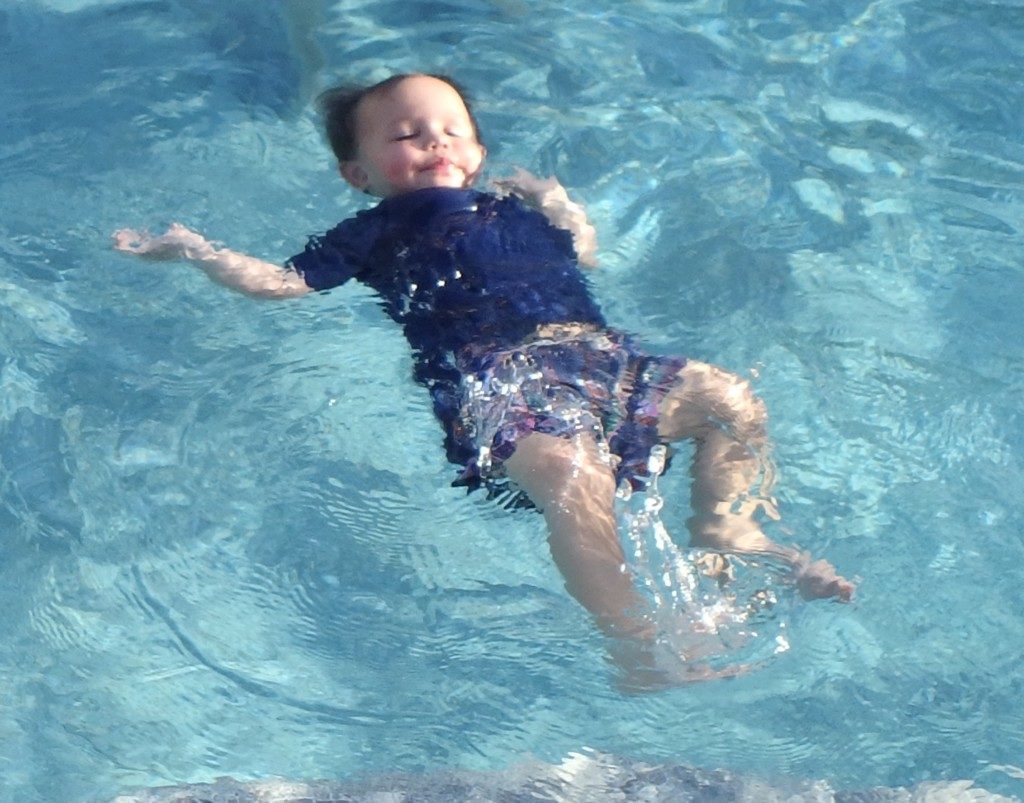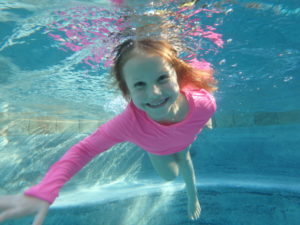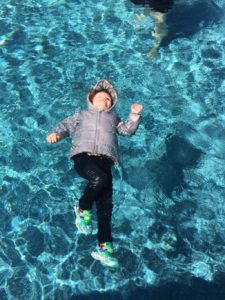Disclaimer: Drownings can occur with experienced swimmers; please find a teaching method of swimming that fits your family. This is the experience of the writer and cannot substitute for your own research and/or experiences. No two children are the same, and every child may respond to teaching methods differently.

My overachieving tendencies began at a young age; the tale is that I was swimming before I walked. At nine months of age, I could fall into a pool and float until my parents stopped showing their friends my cool trick. Growing up in Florida, most homes had a pool or were close to a body of water, and preventing drowning was literally more important than teaching me to walk.
As I’ve had children of my own, and they’ve graduated from being worn in my Ergo to tottering all over the place, my fear of drowning has increased exponentially.
We visit my family in Florida often, and every single one of them has a pool. Adults enjoy a happy hour beverage while we all hang out poolside. All the other adults balance the chit chat with a watchful eye while I operate at Momcon 5: all sensory abilities geared towards monitoring where the kids are and if they are visible and safe. Assumed responsibility is a loophole; I know I can never assume someone else is watching. Even while I keep a close eye on each of them, I know that all it takes is seconds for a drowning to occur, and I have had to jump in fully clothed when my child did go underwater unexpectedly.
We tried the common swim classes that ease children into the water with Mommy nearby. They started by blowing bubbles in the water and holding onto the pool wall for a “monkey crawl.” We did this for two years, and the progress didn’t feel quick enough. Every summer I would start to panic in realization that they would be around water more often and could not swim independently. When my middle child became fearful of the water despite these classes, I knew we needed a different approach. Infant Swimming Resource (ISR) is what worked for us, and the entire process has been eye-opening. I only wish I had started it sooner.
ISR was founded in 1966 by Dr. Harvey Barnett, which is how my parents were able to access an instructor in the 1980s.
According to their website, ISR pioneered survival swimming lessons for infants and young children:
“ISR believes pool fences, supervision, and pool alarms are important parts of a necessary multi-layered approach to drowning prevention. However, traditional lines of defense break down, and the over 4,000 drowning deaths per year bear a grim testament to the fact that traditional approaches are missing a key component: the child. ISR’s core conviction is that the child is the most important part of a drowning prevention strategy, and our over 300,000 ISR graduates and 800 documented survival stories are proof that children can save themselves.”

My niece and nephew were in ISR before age one, and the second I found a certified instructor here in town, I signed up our children for what one may only describe as a motherhood boot camp/marathon. No amount of carb-loading can prepare you for what ISR entails, but I’m here to share that it is (a) worth it; and (b) survivable. ISR consists of 10-minute, one-on-one classes with a certified instructor five times per week. You will drive longer than it takes to participate in the class, but consistency is key. Five nights a week I make the trek, during the “witching” hour, but as with most extra-curricular activities, you get used to it. And unlike most extra-curricular activities, it doesn’t last long. First-time students average six weeks, and a refresher course is done annually for about two weeks.
Price is a valid concern. While it is pricey on the front end (weekly fees average what monthly group swim classes cost), I budget, knowing it’s only for a small amount of time. In my experience, and from what I know from friends, group swim classes rarely take a non-swimmer to safe swimmer in less than two months. The two years of group classes we took (with some one-on-one lessons) were more expensive than one session of ISR.
Day One was rocky. Our three-year-old cried/screamed her head off the entire 10 minutes. Day Two was the same. I worried we were pushing her into a program that would intensify her fear of water, or only teach her to float and never to functionally swim. Thankfully, while she faced her own fears, I did the same. Our ISR instructor guided my swimmer with a calm disposition that suited both mother and child. By the fourth week, my nervous child was able to float AND swim. At her “graduation,” fully clothed in winter gear, she jumped into the water and floated to calm herself down and take some breaths before swimming to the pool’s edge and getting out safely. Weeks later, she accidentally fell into a friend’s pool, and I was amazed to see she used her muscle memory to float and was confident as she laughed off the entire ordeal.

Our youngest just started his ISR session a few weeks ago. During the first week he wasn’t terribly pleased, but by the second, our 18-month-old jumped into the instructor’s arms with glee. Every child is different, but I have full confidence in the training of our instructor, as she monitors each child for swallowing water, keeping his/her mouth closed, etc. On the first day, our baby was under the water and there were some growing pains, but safety is the number one priority for our ISR instructor. For some children, the ISR organization requires a food and diaper output log to additionally monitor things in infants.
ISR helped my kids and me to overcome our fear of water. Babies (six months and older) learn the self-rescue skill of floating to survive until help arrives, and after one year of age, the instructor works on the float-swim-float routine. My timid four-year-old who used to scream around pools is now a wannabe Michael Phelps. The techniques she learned provided her with the confidence to develop stronger kicks, strokes, and diving skills. Certainly, I will supervise my children closely when they are around water, but I am also grateful they can swim with joy and competence.
You can find San Antonio area ISR instructors on their site.












Our 2.5 year old has been doing ISR lessons since he was 9 months old. One of the best things we’ve ever done! I wrote for MKE Moms Blog and have shared my love for ISR too! 🙂
Best thing we ever did! ISR is life saving and I highly recommend to any parents with babies and especially if you have a pool. My daughter was swimming by 1 1/2 and my son is currently enrolled. Love this program. Thanks for getting a positive word out about these lessons and I hope it will save a life by reading.